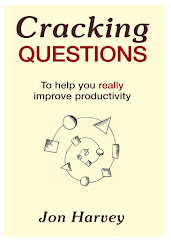This is my model of how to achieve whole system change using the kinds of events I have described below in various postings such as
here,
here and
here!
We need
complexity to be 'held' (or 'cradled' even) by the system itself. It is not a question of hiring some super bright team of consultants at huge expense to come and 'do' change to the system. In my view - the best (i.e. most sustainable, efficient, effective and adaptable) organisational / system comes from the system itself. (Please see my other
blog for lots of ideas that are all about doing that.) The processes need to be assembled to enable the system (i.e.
all the people who know care or can do something about change) to understand and harness its own complexity. It is unlikely that this can be done by anything (or anyone) other than the whole system itself.
Creativity is required so that new solutions can emerge. In attempting to make improvements there is, in my experience, a great deal of doing the same things only harder or longer. We need to stand back, and take a sideways look, and do something different! (Perhaps the 'solution' to low rates of breast feeding in some communities, for example, is not a whole number of new 'Mother and Baby' groups but instead a 20 metre high sculpture of a woman breastfeeding her baby in the local shopping centre...!) If you always do what you have always done, you will always get what you have always got (as someone once said - but I don't know who though!)
Finally we need commitment. Without involving and really engaging people: the people who will have to take the actions forward, it is unlikely that the improvements will actually happen in the long term in my view. I have seen far to many ideas & great plans, no doubt brilliant in conception, fizzle out for want of someone to take it forward.
To get these three components present, we need
imaginative processes that inspire people to think of different things. This may need (what I call) '
Blue Peter' type materials (glitter, cardboard tubes and glue) to encourage people to 'mess around' with what the future needs to be. Or you may just need to
'Open Space' and
allow people to think and talk without boundaries or someone telling them what they
should be discussing... (as most structured events & conferences do...).
We also need a
focus on the future, so that people are helped to think about what
could be rather that
what wasn't. Yes, of course, there must be reflection on the past ('those who cannot remember the past are condemned to repeat it'
George Santayana) but it is vital, in my view, that people are encouraged to gaze into the future and consider what could and should be.
Finally the last ingredient is the need for authentic dialogue. In the events I have run, one of the things I say (and I try to say as little as possible and essentially just get out of the way as soon as I can) is that everyone has something to say and everyone should be respected. And respecting someone means that it is OK to disagree or agree. There should be courtesy and honest inquiry in bucketfuls. On the otherhand, deference, paternalism, and unctuous patronising conversations where professionals 'listen' carefully to users / customers / citizens and then ignore what they say a day or so later have no place in authentic whole system processes in my view.
In this way 'getting the whole system in the room' can be a hugely powerful motor for change that delivers the kinds of robust results that all the stakeholders want and need.









.jpg)


